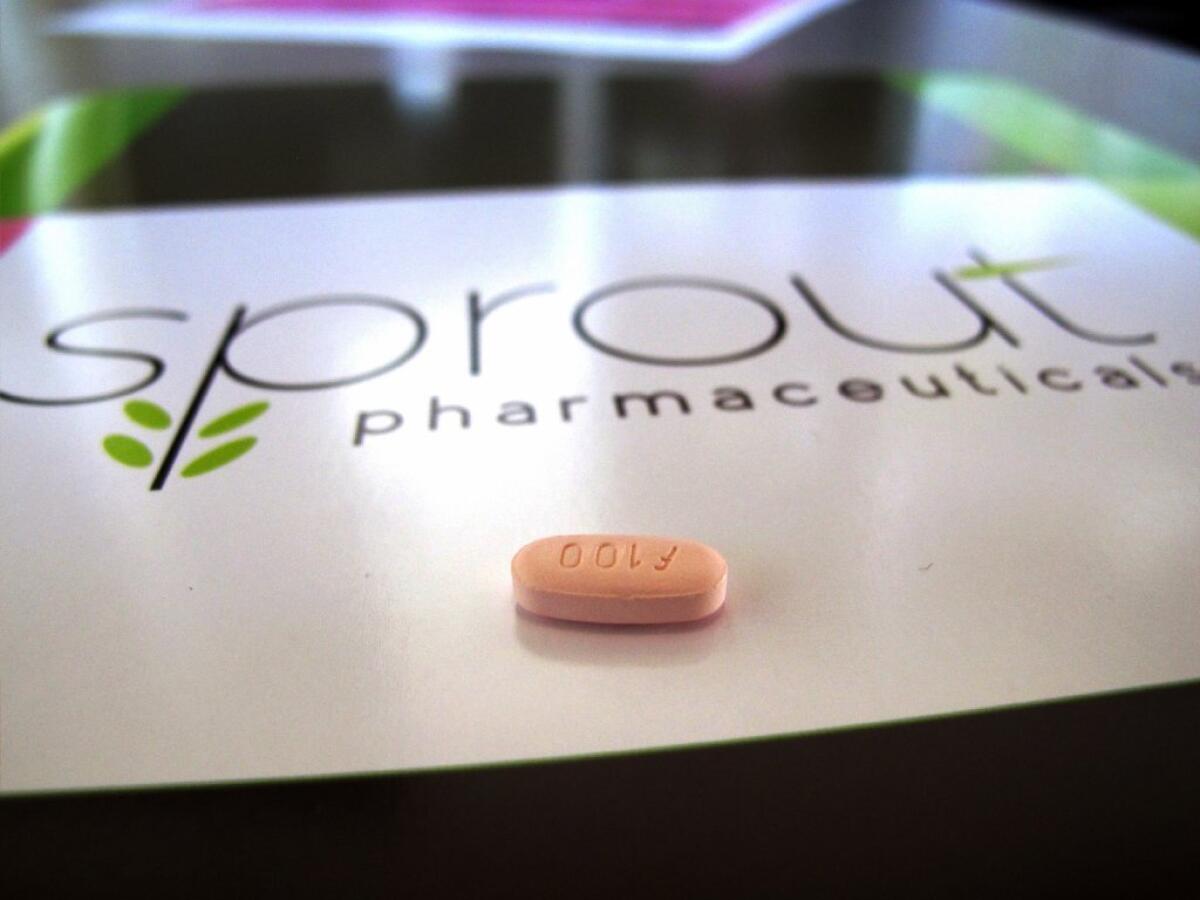‘Female Viagra’ a political tightrope for FDA, advisors warn

A pill for low female sex drive dubbed “pink Viagra” is weathering turbulence as a decision by the Food and Drug Administration nears.
- Share via
Science and politics are making uneasy bedfellows as officials at the Food and Drug Administration weigh a proposed drug to enhance female sexual desire, a trio of experts on drug safety warned Monday.
The FDA is expected to decide next month whether it will allow Sprout Pharmaceuticals to market the drug flibanserin as a treatment for low sexual desire in premenopausal women. The agency has rejected flibanserin twice before. But its latest round of deliberations follow last month’s 18-6 vote in favor of approval by an FDA advisory panel convened to consider the pros and cons of the proposed medication.
In an editorial published online Monday in JAMA, three members of the advisory panel warned that the agency’s decision is being made in a “politically charged atmosphere.”
In the latest deliberation, they write, the FDA’s scientific assessment of flibanserin has been buffeted by accusations of gender bias and a public-relations campaign paid for by the drug’s manufacturer. The agency’s objective weighing of the drug’s risks and benefits has been challenged by shifting measures of effectiveness, they note. And they caution that flibanserin’s impact on the public’s health would be a serious unknown.
The three editorial authors are members of the FDA’s advisory panel on bone, urological and reproductive drugs. They are Dr. Walid F. Gellad of the University of Pittsburgh, Kathryn E. Flynn, a researcher at the medical College of Wisconsin, and Dr. G. Caleb Alexander of Johns Hopkins University.
Last month’s vote recommending approval of flibanserin came in the midst of a lobbying campaign and social-media blitz mounted by an advocacy group calling itself Even the Score. Noting that the FDA has approved 26 medications for male sexual dysfunction but none for women, Even the Score suggested that the FDA is neglecting women.
The campaign prompted letters from members of Congress and a flurry of support from women’s groups.
But Even the Score, wrote the authors of the JAMA editorial, was “initially created through the efforts of a consultant to flibanserin’s manufacturer who formerly directed the FDA’s Office of Women’s Health.” This is hardly the first time a drug manufacturer has underwritten a seemingly grass-roots campaign in a bid to get its drug approved, but “claims of gender bias regarding the FDA’s regulation have been particularly noteworthy,” the authors wrote.
The deliberation over flibanserin also stands on shifting scientific grounds, they wrote.
Having failed to show effectiveness in its intended use as an antidepressant, flibanserin was repurposed as a female libido enhancer after subjects who took it suggested they experienced increased sex drive.
In two earlier submissions, the FDA and its advisory panels found scant evidence of such a change. And both the agency and its independent advisors were concerned by a wide range of potential safety problems for patients taking the medication, including low-blood pressure and risk of fainting, sleepiness that could last into the next day, and potential adverse reactions when flibanserin is taken by women who drink alcohol or take contraceptive pills.
Gellad, Flynn and Alexander wrote that in its third submission to the FDA, Sprout Pharmaceuticals switched its primary measure of the drug’s effectiveness from a rigorous standard to one that asked participants simply to rate their level of sexual desire. In a subjective matter such as sex drive, that might seem logical enough, they wrote, but such “patient-reported outcome claims” are the basis for drug approval in fewer than 20% of FDA approvals. The measure leaves a lot of questions unanswered, they said.
Sprout Pharmaceuticals also offered new research to dispel concerns about flibanserin’s safety. But those also leave unresolved questions, the authors wrote. A study that suggested that a woman could safely take flibanserin if she avoided alcohol was conducted on 25 healthy volunteers, only two of whom were women.
Mainly, the trio of FDA advisors fretted that if approved, flibanserin would likely make its way into the medicine cabinets of people who do not fit the narrow population in which the drug’s safety has been tested. Men, women who drink, and older, sicker women, including many who take medications for other conditions, will probably ask their physicians to prescribe flibanserin for them. Despite its approved FDA “indication” -- as a medication for premenopausal women without other psychiatric diseases -- doctors could legally prescribe it to such petitioners.
As flibanserin makes its way into a larger and sicker population than that in which it’s been tested, the FDA may establish registries and strict pharmacy-dispensing rules to discourage “off-label” prescribing and bring safety problems quickly to light. But there’s little evidence, the authors wrote, that shows such programs are effective.
Follow me on Twitter @LATMelissaHealy and “like” Los Angeles Times Science & Health on Facebook.







